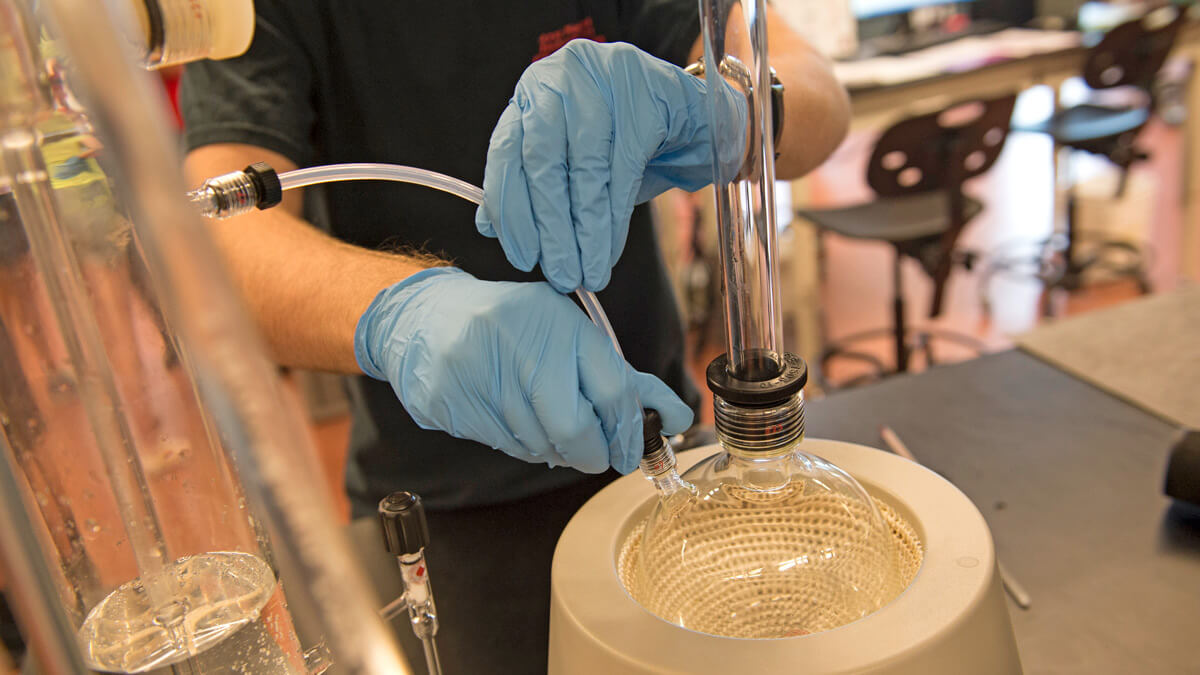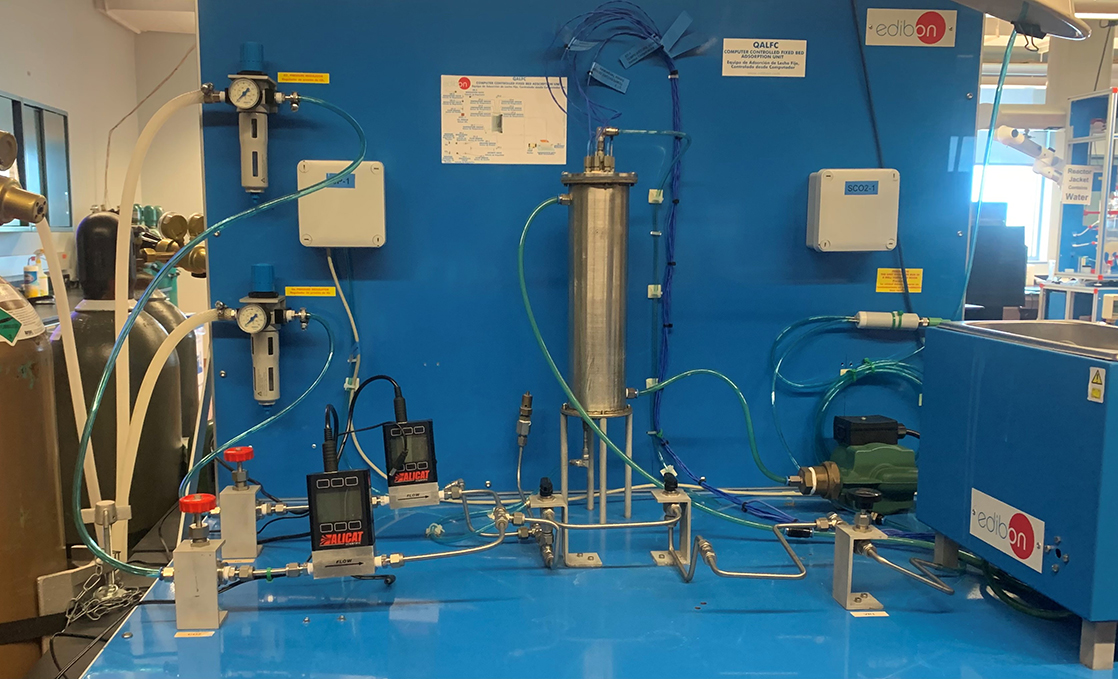Chemical Engineering Bachelor of Science Degree

Chemical Engineering
Bachelor of Science Degree
- RIT /
- College of Engineering /
- Academics /
- Chemical Engineering BS
Overview for Chemical Engineering BS
Why Pursue a Chemical Engineering Bachelor’s Degree at RIT
Team-Based Capstone Project: A capstone design experience in the fifth year integrates chemical engineering theory, principles, and processes in a collaborative team environment.
Hands-On Experience: Four blocks of cooperative education mean nearly a year of hands-on, full-time paid work experience in industry.
Strong Career Paths: Students hired at industry-leading companies such as Bausch & Lomb, Boston Beer Company, Bristol Myers Squibb, Eastman Kodak Company, Global Tungsten and Powders, Northrop Grumman, Samsung Austin Semiconductor, The Hershey Company, and more.
Accelerated Bachelor’s/Master’s Available: Earn both your bachelor’s and your master’s in less time and with a cost savings, giving you a competitive advantage in your field.
STEM-OPT Visa Eligible: The STEM Optional Practical Training (OPT) program allows full-time, on-campus international students on an F-1 student visa to stay and work in the U.S. for up to three years after graduation.
RIT’s degree in chemical engineering is a comprehensive program of study that prepares you to advance nano-scale composites, semiconductors, pharmaceuticals, plastics, fibers, metals, and ceramics and to develop alternative energy systems, biomedical materials and therapies, and strategies that minimize the environmental impact of technological advancements.
Chemical engineering applies the core scientific disciplines of chemistry, physics, biology, and mathematics to transform raw materials or chemicals into more useful or valuable forms, invariably in processes that involve chemical change. All engineers employ mathematics, physics, and engineering to overcome technical problems in a safe and economical fashion. A chemical engineer provides the critical level of expertise needed to solve problems in which chemical specificity and change have particular relevance. They not only create new, more effective ways to manufacture chemicals, but they also work collaboratively with chemists to pioneer the development of high-tech materials for specialized applications. Well-known contributions include the development and commercialization of synthetic rubber, synthetic fiber, pharmaceuticals, and plastics. Chemical engineers contribute significantly to advances in the food industry, alternative energy systems, semiconductor manufacturing, and environmental modeling and remediation. A special focus on process engineering cultivates a systems perspective that makes chemical engineers extremely versatile and capable of handling a wide spectrum of technical problems. Students develop a firm and practical grasp of engineering principles and the underlying science associated with traditional and emerging chemical engineering applications.
RIT’s Bachelor’s in Chemical Engineering
The core curriculum of RIT’s chemical engineering BS degree provides you with a solid foundation in engineering principles and their underlying science.
You will choose professional technical electives from within the major, as well as from a department-approved list of engineering courses offered throughout the Kate Gleason College of Engineering. These electives provide an in-depth examination of the chemical engineering field or provide breadth in other engineering disciplines. Mathematics and science courses, free electives, and liberal arts courses round out the curriculum.
Learn more about the Student Learning Outcomes and Program Educational Objectives for the chemical engineering BS degree.
How is Chemical Engineering Different from Chemistry?
Virtually every aspect of a modern industrial economy is critically dependent upon chemical engineering for manufacturing bulk and specialty chemicals and high-tech materials needed to create a limitless array of value-added products. Chemical engineering applies the core scientific disciplines of chemistry, physics, biology, and mathematics to transform raw materials or chemicals into more useful or valuable forms, invariably in processes that involve chemical change. They work in multidisciplinary teams to create novel materials that are at the heart of virtually every product and service that enhances our quality of life. Examples include nano-scale composites, pharmaceuticals, plastics, fibers, metals, and ceramics. Key applications include the development of alternative energy systems, biomedical materials and therapies, and strategies to minimize the environmental impact of technological advancements.
The line between the functions of chemists and chemical engineers can be blurred, but a general distinction can be made between the function of the two disciplines. Perhaps the clearest distinction can be made in the area of chemical transformation. Typically, chemists develop new molecules via chemical reaction, examine the underlying mechanisms involved, and make precise measurements of both physical and organic chemistry parameters on a bench scale in small volumes. Chemical engineers utilize the work of chemists to build processes to manufacture and purify chemicals and new materials on a larger scale. Using their knowledge of scientific principles (physical and organic chemistry integrated with physics, mathematics, and biology) and design constraints (such as economics and environmental requirements), chemical engineers develop processes to manufacture raw materials with desired purity on a scale that meets the demands of virtually every industry in our modern society.
Hands-on Experience in Chemical Engineering
As a student in the chemical engineering BS, you will gain valuable hands-on experience through specific program requirements, including a capstone experience that features two dynamic courses:
- Design with Constraint is taught in a workshop structure with lectures and in-class applications of concepts. You will examine typical constraints on design and their integration with technology.
- Advanced Design Capstone requires you to work in teams to design and simulate a realistic chemical manufacturing plant, drawing upon and integrating the knowledge you have acquired from all of your core chemical engineering courses, electives, and co-op experiences completed over the previous five years of study.
Furthering Your Education in Chemical Engineering
Your degree in chemical engineering opens doors to a variety of options when it comes to furthering your education:
- Pre-Health Professions Program: An advising program designed to help you prepare a competitive application for admission into medical schools and graduate programs in the health professions.
- Pre-Vet Advising Program: An advising program to help you maximize your candidacy for admission to veterinary schools.
RIT’s Combined Accelerated Bachelor’s/Master’s Degrees enable you to earn both a bachelor’s and a master’s degree in as little as five years, giving you a competitive advantage.
- Chemical Engineering BS/MS: Apply core scientific disciplines (e.g., mathematics, physics, and chemistry) to devise ways to transform raw materials into valuable products that span across industries from food and pharmaceuticals to plastic and fuels. You'll also learn broad and specialized tools to tackle the creation of novel materials and processes to ensure a high-tech, clean, and sustainable future, including semiconductors, non-conventional therapeutics, atom-scale green chemical industry, renewable energy systems, battery and alternative energies, and more. You will also learn foundations for lateral migration into non-traditional fields like nuclear energy, marine energy, or technology for space exploration.
- Chemical Engineering BS/Science, Technology, and Public Policy MS: Build a strong foundation in chemical engineering while gaining the policy knowledge needed to navigate and influence the regulatory and societal contexts of scientific innovation. By combining technical and public policy education, you’ll be prepared to lead in industries where science, sustainability, and policy intersect.
- Chemical Engineering BS/Materials, Science, and Engineering MS: Pairs a solid foundation in chemical engineering with advanced study in materials science and engineering, equipping you to design, analyze, and optimize materials for cutting-edge applications. You’ll graduate with the interdisciplinary expertise needed to drive innovation in industries like energy, biotechnology, and advanced manufacturing.
- Chemical Engineering BS/Industrial and Systems Engineering MS: Master chemical engineering fundamentals while gaining advanced skills in systems design, data analysis, and process optimization. You'll learn to improve complex systems across industries—from manufacturing to healthcare.
What’s the Difference Between Engineering and Engineering Technology?
It’s a question we’re asked all the time. While there are subtle differences in the course work between the two, choosing the right major in engineering or engineering technology is more about identifying what you like to do and how you like to do it.
-
#57 Best Engineering Undergraduate Programs, 2026
RIT’s engineering majors are ranked among the Best Undergraduate Engineering Programs in the nation.
-
Join us for Fall 2026
There's still time to apply. For some programs, applications will be reviewed on a rolling, space-available basis.
-
Join Us for Accepted Student Open House
Visit campus on March 28 or April 11 to meet faculty, tour campus, and ask your questions.
Careers and Cooperative Education
Typical Job Titles
| Chemical Engineer | Semiconductor Engineer | Environmental Engineer |
| Chemical Process Engineer | Manufacturing Engineer | Quality Engineer |
| Systems Engineer |
Industries
-
Aerospace
-
Automotive
-
Biotech and Life Sciences
-
Defense
-
Food and Beverage
-
Pharmaceuticals
-
Utilities and Renewable Energy
Cooperative Education
What’s different about an RIT education? It’s the career experience you gain by completing cooperative education and internships with top companies in every single industry. You’ll earn more than a degree. You’ll gain real-world career experience that sets you apart. It’s exposure–early and often–to a variety of professional work environments, career paths, and industries.
Co-ops and internships take your knowledge and turn it into know-how. Your engineering co-ops will provide hands-on experience that enables you to apply your engineering knowledge in professional settings while you make valuable connections between classwork and real-world applications.
Students in the chemical engineering degree are required to complete four blocks (48 weeks) of cooperative education. This work experience, coupled with the professional networks created by our students and alumni, often translates into job opportunities after graduation. Additionally, for those students who develop an interest in research and demonstrate aptitude in the classroom, a limited number of co-op opportunities are possible in which students will work alongside professors as they conduct research in the chemical engineering field.
Featured Work and Profiles
-
RIT Research Minute: Ethylene from Methane Feedstock
Obioma Uche RIT Assistant Professor, Dr. Obioma Uche is researching how to produce ethylene from methane feedstock with the goal of creating environmental and economic benefits. Learn more about what she and her...
Read More about RIT Research Minute: Ethylene from Methane Feedstock -
RIT Research Minute: Soft Matter Signaling
Jairo Diaz Amaya Professor Jairo Diaz and his research team are experimenting with soft matter to create new materials for the future. Learn how they’re changing the internal structure of tiny microscopic droplets to...
Read More about RIT Research Minute: Soft Matter Signaling -
NIH Grant Supports RIT’s Fight Against Drug-Resistant Bacteria in Sepsis
RIT researcher Ke Du has received an NIH grant to develop a microfluidic device that rapidly detects drug-resistant bacteria causing sepsis, improving diagnosis and treatment.
Read More about NIH Grant Supports RIT’s Fight Against Drug-Resistant Bacteria in Sepsis -
Uche Awarded NSF Early Career Grant for Sustainable Methane Conversion
RIT chemical engineering professor Obioma Uche has received an NSF Early Career Award to explore new catalysts for converting methane to ethylene, aiming to reduce greenhouse gas emissions and improve...
Read More about Uche Awarded NSF Early Career Grant for Sustainable Methane Conversion -
East Meets West: Student Tackles Biotechnology Challenges with a Fulbright Award
Hira Abid RIT student Hira Abid is set to transform global health solutions as she starts her Fulbright journey at Koç University in Istanbul, blending her chemical engineering expertise with a deep cultural...
Read More about East Meets West: Student Tackles Biotechnology Challenges with a Fulbright Award
Curriculum for 2025-2026 for Chemical Engineering BS
Current Students: See Curriculum Requirements
Admissions and Financial Aid
This program is STEM designated when studying on campus and full time.
First-Year Admission
First-year applicants are expected to demonstrate a strong academic background that includes:
- 4 years of English
- 3 years of social studies and/or history
- 4 years of math is required and must include algebra, geometry, algebra 2/trigonometry, and pre-calculus. Calculus is preferred.
- 2-3 years of science. Chemistry and physics are required.
Transfer Admission
Transfer applicants should meet these minimum degree-specific requirements:
- A minimum of pre-calculus is required. Calculus is preferred.
- Chemistry and physics is required.
Financial Aid and Scholarships
100% of all incoming first-year and transfer students receive aid.
RIT’s personalized and comprehensive financial aid program includes scholarships, grants, loans, and campus employment programs. When all these are put to work, your actual cost may be much lower than the published estimated cost of attendance.
Learn more about financial aid and scholarships
Accreditation
Research
The faculty and students in the Kate Gleason College of Engineering are engaging in numerous areas of research, which takes place across all of our engineering disciplines and often involves other colleges at RIT, local health care institutions, and major industry partners. Explore the college's key research initiatives to learn more about our research in:
Related News
-
November 19, 2025

Club sports help students find their fit
Club sports are a big part of student life at the university. Every year, about 2,000 students are involved with the nearly 50 different club sports. For many, it scratches that competitive itch. For others, it’s a chance to try something new, find a community, and stay active.
-
May 20, 2025

RIT Research Minute: Ethylene from Methane Feedstock
RIT Assistant Professor Obioma Uche is researching how to produce ethylene from methane feedstock with the goal of creating environmental and economic benefits.
-
February 20, 2025

Engineering faculty receives DARPA Young Faculty Award honors
Jairo Diaz Amaya, assistant professor of chemical engineering was honored with a Defense Advanced Research Projects Agency (DARPA) Young Faculty Award for his work conducting fundamental research in the fabrication and self-assembly of colloids—key elements of soft matter.
Contact
- Brian Landi
- Department Head
- Dean’s Office
- Kate Gleason College of Engineering
- 585‑475‑4726
- bjlsps@rit.edu
Department of Chemical Engineering














